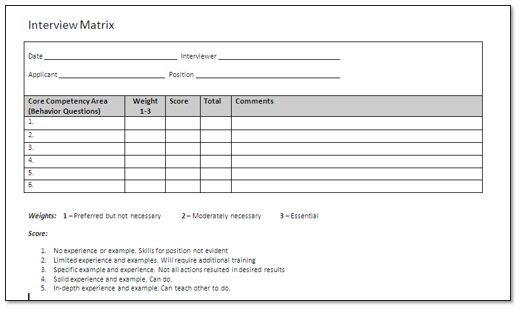1. Preparing for an Interview
Develop the Interview Structure
- Who will be involved and what is their role?
- Develop the interview format (1:1, panel, etc.)
- How many rounds of interviews will there be?
- Plan the logistics regarding date, location, etc.
- Give candidates pre-work or pre-questions (optional)
Decide who to interview
Qualifications: Who has the qualifications you are looking for?
Availability: Which candidates are available when you need the role filled/staffed?
Fit: Based on the information you know so far, who might be a good fit for your team?
Develop the interview guide
Use a structured interview guide with the same questions for each candidate utilizing behavioral based interview questions:
- Ask questions based on discovering how a candidate acted in specific situations.
- Logic is that a person’s behavior doesn’t fundamentally change over the course of their adult life. Their past performance will likely predict future performance.
- Instead of asking how you would behave, we ask how did you behave?
- Behavioral interviews are structured around core competencies.
Choose 5 to 8 statements for each dimension:
Experience
- Past execution of needed skills
- Education
- Certifications
Capabilities
- Ability to execute what’s needed
- Critical thinking skills
- Accomplishments
Behavioral Traits
- Collaboration skills
- Style/Culture fit
- Attitude
2. Conducting the Interview
Best Practices
- Provide a private location with no disruptions.
- Put the candidate at ease (offer water, establish rapport).
- Make introductions and explain the interview format.
- Stay on track – begin and end on time.
- Know the organization – be prepared to answer basic questions, sell the job, your department, our culture.
- Give the candidate enough time to think/respond.

Things to Avoid
-Attractiveness: Candidates should never be evaluated on their physical appearance.
-Similar to me: A candidate should not rise to the top simply because they are similar to you in personality.
-First impressions: Give candidates a chance to make an impression before you make a judgment.
-Drawing conclusions: Keep an open mind.
-Cultural differences: Different cultures have different norms regarding eye contact, handshakes, greetings, etc.
Avoid asking leading questions.
Other assumptions:
- Smart people = excellent employees
- Strong technical/job knowledge = leadership capability
- Top/bottom schools or companies determine quality of candidate
Peer/Panel Interviews
What is Peer Interviewing?
Peer interviewing uses a team of peers to interview and evaluate candidates based on skills and prior experience.
Why Peer Interviews?
- Increases accuracy of a cultural fit between the candidate and the organization.
- Increases the chances of employees being satisfied with a dependable, hard-working team member.
Peer Interviewing makes the peer:
- Feel respected for their experience and skill
- Empowered to support the goals of the organization by choosing great staff
- Invested in the process of finding a cultural fit for the organization
- Feel a sense of ownership for the organization
Selecting Your Team:
The department leader selects high-performers who will work closely with the new hire or receive service from the position. A Leader should consider the several things when selecting the peer interview team.
- A High Performer: An employee who consistently demonstrates the standards of behavior and delivers the results. They should be role models within the department
- Panel consist of: 4-6 members, depending on department size. The same team stays together as long as the position is open.
- Prepare the interview team: – Complete the LMS learning titled Selecting Talent with Peer Interviewing – Review the process of the Decision Matrix – Review the Interview Matrix

Review the job description before the interview.
Documentation
- Write down facts – not your opinions
- Be sure to recognize what they said versus what you infer
- Remember that interview notes can be subpoenaed
- Before you write, ask yourself – do I really need this information to judge a candidate’s qualifications for the position?
- The Hiring manager should save documents for three years on applicants you interview and the duration of the persons tenure that you hire
- Collect collateral from the interview panel and destroy [/learn_more
3. Candidate Selection
Candidate Evaluation
- Compare candidates on same criteria
- Measure candidates against competencies
- Discuss strengths and opportunities
- Rate and/or rank the candidates
Guidelines for Ranking
- Follow the established criteria/roles for decision making
- Compare candidates on same criteria
- Be objective and keep an open mind
- Assess the whole candidate, including strengths & opportunities
- Remember: no candidate is perfect
- Consider the candidates potential
- Consider the candidates culture fit
- Consider your ability to train vs. your need for experience
- Consider your own tendencies & biases
